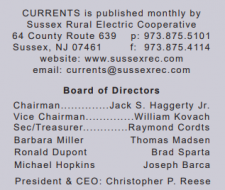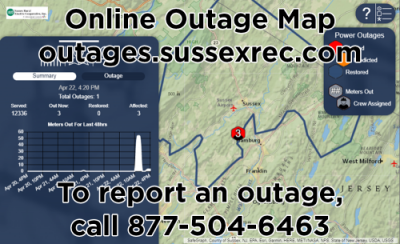To view the full print/pdf version of this issue of Currents, click here
For previous issues of Currents, visit our Currents Library
State of the Cooperative

By: Chris Reese, President & CEO
Email: contacttheceo@sussexrec.com
Due to COVID-19, this past school year ended in an unusual way for our community’s students. Classes had to make the transition to a virtual setting, and things are still uncertain to this day as to how schools will handle reopening. Our local high schools’ graduating classes of 2020 were certainly hit hard by this situation, costing them the usual milestones of prom, graduation, and other end-of-high-school activities.
Sussex Rural Electric Cooperative is a partner to local schools in our education-based programs like our scholarships, Youth Tour, and the Bright Ideas classroom grant. We extend our congratulations to the class of 2020, despite the circumstances, and wish you the best as you look to your future.
For many parents reading this, their own child may be among this group of high school graduates taking their first steps toward the larger world, whether it’s through career training, the military, trade school, or college. This new step can be incredibly daunting, even during a normal year. My own daughter will be going off to college this Fall and as a parent, I think I might be more intimidated by this than she is.
Since this is an important part of growing up, it’s best for us parents to offer them this independence while recognizing the right times for some guidance, which I know is easier said than done. If a child is going to be living away from home for the first time, many parents will focus on the usual “dangers” of college and society while overlooking a safety risk that can affect them every day.
Now, I’m admittedly a bit biased on this topic, but electrical safety is incredibly important and should be taken seriously, especially for those living on their own for the first time. (And when our children finally live on their own and have to start paying an electric bill, maybe they’ll finally turn off the light when they leave a room…)
Often-times students innocently plug in all of their usual desk tools—study lamps, laptops, TVs, game consoles, charging stations, and other electrical devices—into one outlet, unaware of the potential dangers. Plugging in too many appliances can overload an outlet, potentially causing an electrical or fire hazard. I think the only things I had to plug in at my freshman dorm room was a lamp, an alarm clock (not a phone), and a stereo (Remember them? Do they still exist?) to play my cassettes (definitely non-existent now). Things have certainly changed for students, and that electrical risk has only increased.
In its most recent report, the National Fire Protection Association estimates that U.S. fire departments respond to an average of 3,570 fires in dormitories, fraternity or sorority houses, and barracks each year. The tragic results: an average of seven deaths, 54 injuries, and nearly $30 million in direct property damage per year.
Making use of a power strip can help alleviate this issue, but these too can be overloaded if care isn’t given. Erin Hollinshead, Executive Director of Safe Electricity, warns “The limited number of electric outlets in student rooms can tempt many to use multiple extension cords and power strips, which can cause cords to overheat, creating shock and fire hazards. Student residences crammed with books, papers, and bedding can allow the smallest spark to quickly become a blaze.”
This is why we would recommend making use of a smart power strip, like those from GoSund or AHRISE, to get around a low number of available outlets. These power strips will automatically cut power to devices in standby mode, reducing the flow of power and the danger of overloading the circuit. For some other electric safety recommendations for students moving into their new dorm, see the chart below:
|
|
|
|
|
|
|
|
|
|
|
|
These are all small issues that might be taken for granted, but they each have the potential to be catastrophic. When a child moves on to college or elsewhere outside the family home, it is now up to them to look out for their own safety. This is why, as parents, it’s important to instill in them an understanding of every day dangers they may face and how to best avoid them. With a father who works at an electric cooperative, my daughters have certainly had enough “electric safety talks” for a lifetime. However, many other young people haven’t had as much focus put on its importance. If your student will be moving out this fall, while teaching them to be safe out there, be sure to talk to them about electric safety too.Older wiring in student housing and apartments may not be able to handle the increased electrical demand of today’s college student. If use of an appliance frequently causes power to trip off, or if its power cord or the outlet feels hot, the appliance should be disconnected immediately and the condition reported to the landlord or campus housing staff.
 For more fire and electrical safety information, visit www.SafeElectricity.org.
For more fire and electrical safety information, visit www.SafeElectricity.org.









